Your Brain's 10 Biases That Cause Your Bad Decisions

By:
Sometimes it seems like we make decisions without even thinking about it. But really, there's a lot more going on in our brains than we may realize.
Towergate Insurance released a handy illustrated guide, "How Cognitive Biases Affect Our Everyday Decisions" that shows how 10 common cognitive biases affect our daily thinking. They report that we make up to 35,000 decisions per day.
These biases can easily factor in to how we make those decisions. Once you realize what they are, they're easy to spot, especially when you're having a heated discussion with a group or browsing a popular Reddit thread.
1. Bandwagon Effect
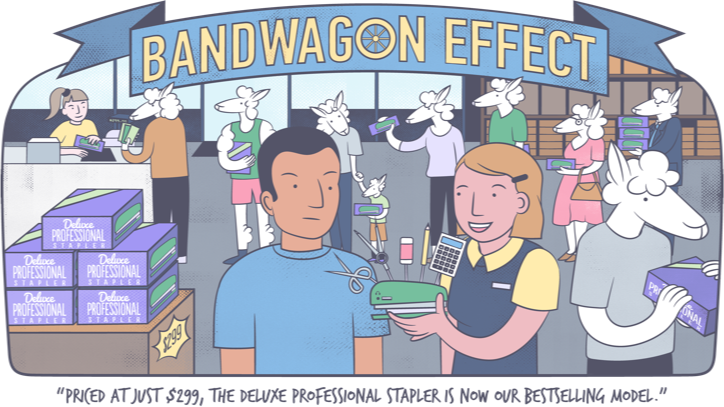 Towergate Insurance - co.uk
Towergate Insurance - co.uk
The Bandwagon Effect is, to quote Towergate, "believing or doing something because people around you believe or do it." If someone really wants or values something, their desire could make you want it even more. This is where the phrase "jumping on the bandwagon" comes from. To jump on the bandwagon means to follow a trend.
Sometimes these trends have good benefits, like the ALS Ice Bucket challenge, but it's more common to see the Bandwagon Effect when it's in pursuit of a fashion item or must have Christmas toy. And sometimes, it's even harmful, like in the case of Instagram challenges that perpetuate unrealistic body standards.
2. Availability Heuristic
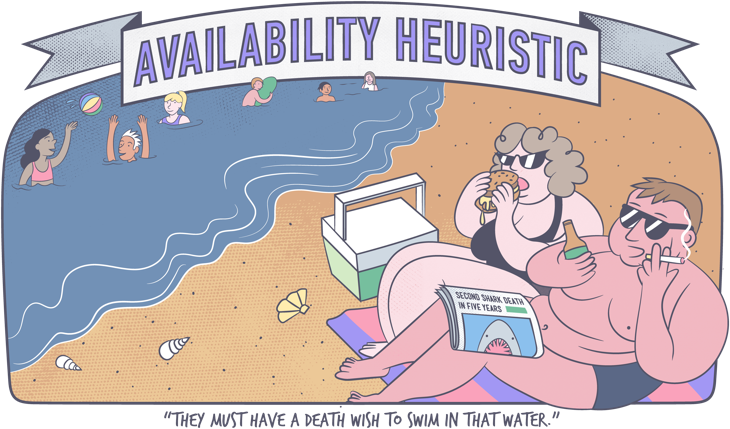 Towergate Insurance - co.uk
Towergate Insurance - co.uk
Defined as, "overestimating the importance of information that is easiest to recall." Meaning, in the above illustrated example, the couple is more concerned with the perceived threat of death by sharks, when the actual threat of death by smoking and/or obesity is far greater. To use the shark attack example, you are 30 times more likely to be killed by lightning than a shark, according to Discovery News. But it seems like we hear more about shark attacks than we do about fatal lightning strikes. Blame "Jaws."
3. Dunning-Kruger Effect
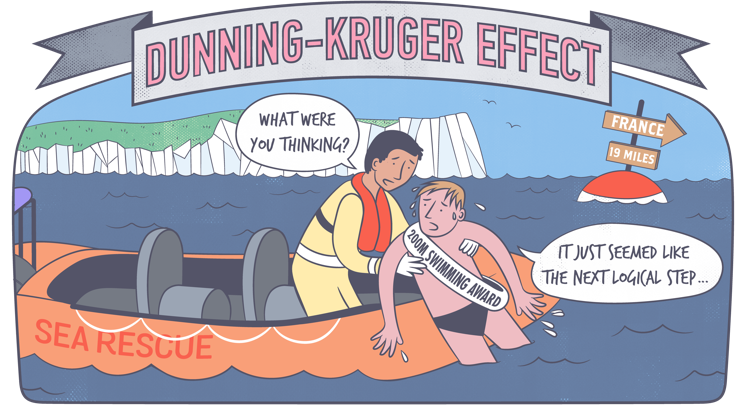 Towergate Insurance - co.uk
Towergate Insurance - co.uk
"Unskilled individuals overestimating their abilities and experts underestimating theirs," is how Towergate explains the Dunning-Kruger effect. Those without proper experience tend to overestimate their knowledge of said experience, while those who are experienced tend to do the opposite (they underestimate). Those who underestimate despite their knowledge and experience usually do so because they tend to "overthink" the situation.
In other words, to quote William Shakespeare from "As You Like It", "The fool doth think he is wise, but the wise man knows himself to be a fool."
4. Framing Effect
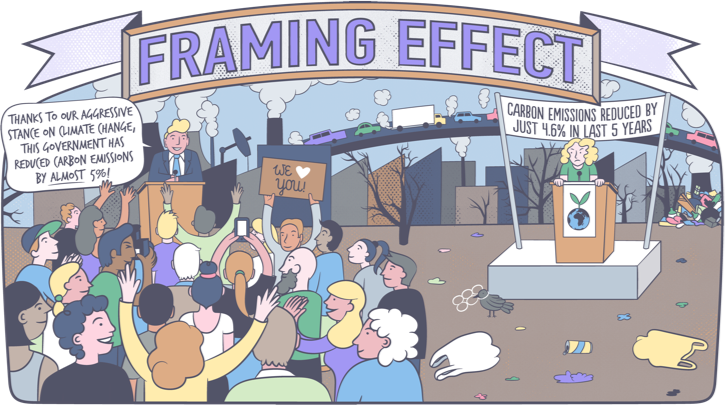 Towergate Insurance - co.uk
Towergate Insurance - co.uk
The Framing Effect is "drawing different conclusions from the same information presented differently." For example, this explains how Bernie Sanders supporters and Hillary Clinton supporters could draw vastly different conclusions about how their chosen candidate is doing in the polls based on which sources they read.
5. Confirmation Bias
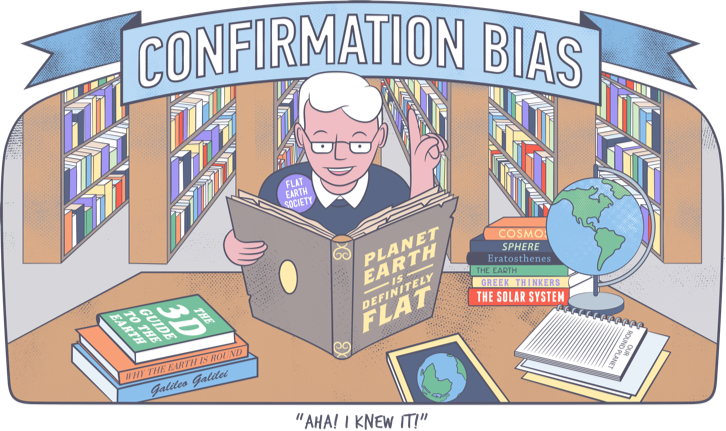 Towergate Insurance - co.uk
Towergate Insurance - co.uk
Perhaps the most well-known of the cognitive biases, the confirmation bias is "Seeking and prioritizing information that confirms your existing beliefs." This also explains how certain groups of people (like "high-energy" Donald Trump supporters) can insist that their belief is the correct one (such as "Donald Trump is not misogynistic") despite evidence to the contrary (like this tweet).
6. Curse of Knowledge
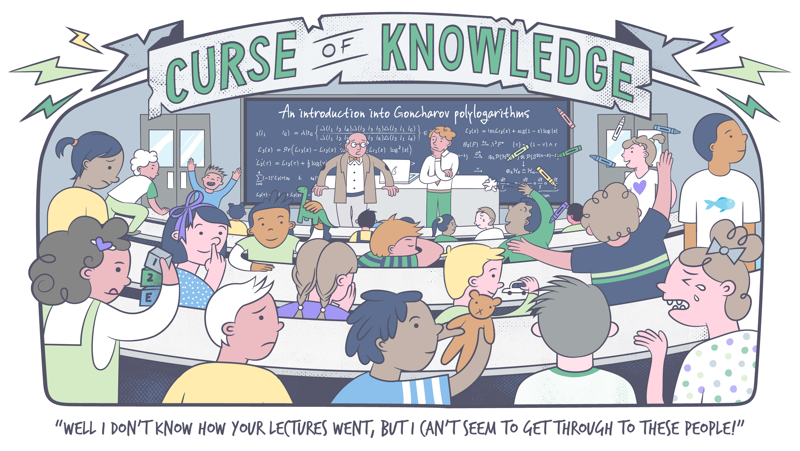 Towergate Insurance - co.uk
Towergate Insurance - co.uk
"Struggling to see a problem from the perspective of someone with less knowledge than you," is one easy way to sum up the Curse of Knowledge bias. Basically, when explaining something, don't assume that everyone else has the knowledge and experience that you have. Keep it simple.
7. Reactance
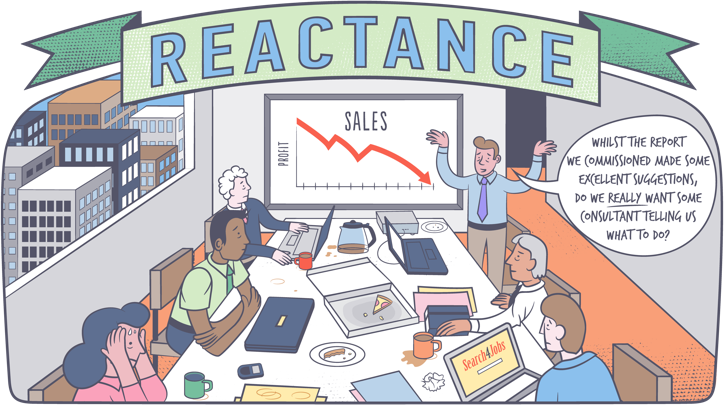 Towergate Insurance - co.uk
Towergate Insurance - co.uk
Reactance is "the desire to do the opposite of what is requested or advised, due to a perceived threat to freedom of choice." Basically, this one is all about ego. If you're shown information that conflicts with what you believe is solidly correct, it can be difficult for you to put your ego aside and make a more informed decision.
8. The Sunk Cost Fallacy
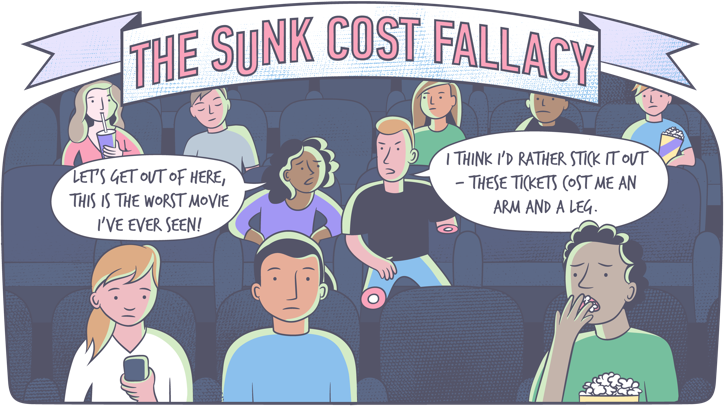 Towergate Insurance - co.uk
Towergate Insurance - co.uk
If you spend only five minutes on /r/relationships, Reddit's relationship advice forum, you're bound to see several mentions of the sunk cost fallacy. Towergate describes it as, "Refusing to abandon something unrewarding because you’ve already invested in it."
To borrow a Reddit example, if you've been in a bad relationship for 2 years and are afraid to leave because of all the time you've invested in it, most Redditors will tell you not to buy into the sunk cost fallacy, because the only thing worse than staying in a bad relationship for 2 years is staying in a bad relationship for 2 years and 1 day. Get out when it's bad.
9. Hindsight Bias
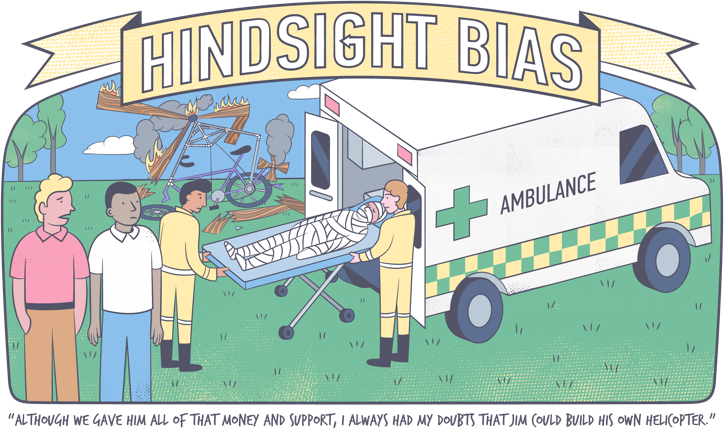 Towergate Insurance - co.uk
Towergate Insurance - co.uk
Hindsight bias is simply "believing that you could have predicted an event after it has occurred," because things tend to look more obvious in hindsight. One example is when Microsoft created Twitter bot Tay, never thinking that their creation would turn into a racist sex-crazed twitter abomination. It's easy to look back and say, "Well duh" but if the outcome were that obvious, Microsoft never would have done it.
10. Anchoring Effect
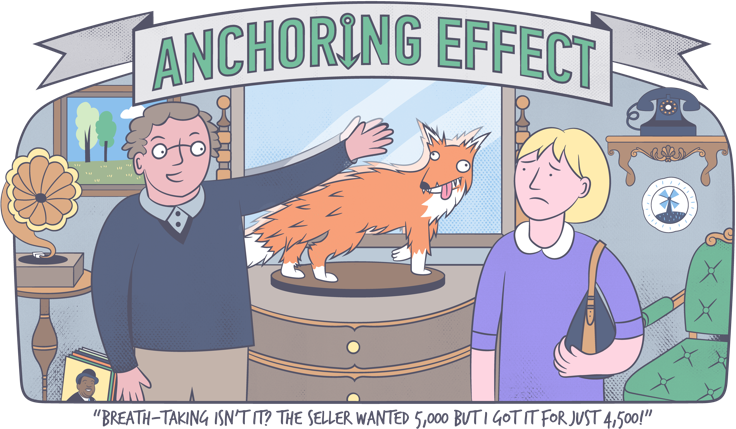 Towergate Insurance - co.uk
Towergate Insurance - co.uk
Finally, the Anchoring Effect is "excessively focusing on the first piece of information you receive when making a decision." This is a common tactic stores use when they're trying to move merchandise that isn't selling. They'll present the item with a sign showing a huge mark down hoping that the customer won't stop to think if the item is actually worth the price or if they're just swayed by a seemingly good deal.
Do you generally have difficulty making decisions?
[h/t Lifehacker]
